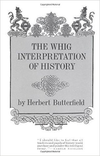Arrived at this book quite by accident (see it being sold here), although for a while it was indicated at an earlier time having being read in class on the subject of history.

The book was first published in 1931, and Butterfield had been the Cambridge Don as can be read here. The book is not big, and people have been confused by it - by the implication of the name without reference. In going through it, Butterfield discusses history and how progressives see it, measure and project, wherein some of his thoughts reminded me of R.G. Collingwood's thinking on history.
Here is a 2012 review:

The book was first published in 1931, and Butterfield had been the Cambridge Don as can be read here. The book is not big, and people have been confused by it - by the implication of the name without reference. In going through it, Butterfield discusses history and how progressives see it, measure and project, wherein some of his thoughts reminded me of R.G. Collingwood's thinking on history.
If we see in each generation the conflict of the future against the past, the fight of what might be called progressive versus reactionary, we shall find ourselves organizing the historical story upon what is really an unfolding principle of progress, and our eyes will be fixed upon certain people who appear as the special agencies of that progress. We shall be tempted to ask the fatal question, To whom do we owe our religious liberty? But if we see in each generation a clash of wills out of which there emerges something that probably no man ever willed, our minds become concentrated upon the process that produced such an unpredictable issue, and we are more open for an intensive study of the motions and interactions that underlie historical change.
Finally in criticism of the whig historian who studies the past with too direct reference to the present day, it may be said that his method of procedure actually defeats his original confessed purpose which was to use the past for the elucidation of the present. If we look for things in the course of history only because we have found them already in the world of today, if we seize upon those things in sixteenth century which are most analogous to what we know in the twentieth, the upshot of all our history is only to send us back finally to the place where we began, and to ratify whatever conceptions we originally had in regard to our own times. It makes all the difference in the world whether we already assume the present at the beginning of our study of history and keep it as a basis of reference, or whether we wait and suspend our judgement until we discover it at the end. The 36 controversialists of the seventeenth century who made a too direct reference of Magna Charta to their own day, were not using the past in such a way as to give them better insight into their own generation, but were arguing in a circle, and, perhaps happily for them, were making their history confirm some of their misconceptions concerning their own present. If we turn our present into an absolute to which all other generations are merely relative, we are in any case losing the truer vision of ourselves which history is able to give; we fail to realize those things in which we too are merely relative, and we lose a change of discovering where, in the stream of the centuries, we ourselves, and our ideas and prejudices, stand. In other words we fail to see how we ourselves are, in our turn, not quite autonomous or unconditioned, but a part of the great historical process; not pioneers merely, but also passengers in the movement of things.
Here is a 2012 review:
